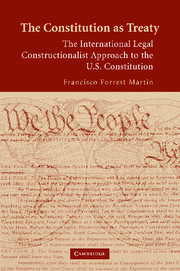 The Constitution as Treaty
The Constitution as Treaty Book contents
- Frontmatter
- Contents
- Prologue
- Introduction
- PART I UNITED STATES COURTS AS INTERNATIONAL COURTS
- 1 Final Judicial Review Authority of Federal and Other International Courts
- 2 The Fallacy of Federal Judicial Activism in Light of International Law's Non Liquet Prohibition Principle
- PART II INTERNATIONAL LAW
- PART III UNITED STATES LAW AS INTERNATIONAL LAW
- Conclusion
- Epilogue
- Index
2 - The Fallacy of Federal Judicial Activism in Light of International Law's Non Liquet Prohibition Principle
Published online by Cambridge University Press: 27 July 2009
- Frontmatter
- Contents
- Prologue
- Introduction
- PART I UNITED STATES COURTS AS INTERNATIONAL COURTS
- 1 Final Judicial Review Authority of Federal and Other International Courts
- 2 The Fallacy of Federal Judicial Activism in Light of International Law's Non Liquet Prohibition Principle
- PART II INTERNATIONAL LAW
- PART III UNITED STATES LAW AS INTERNATIONAL LAW
- Conclusion
- Epilogue
- Index
Summary
According to Francis Bacon, judges are not appointed to make or change the law: “their office is jus dicere and not jus dare.” Such Legal Formalism claims that judges may only apply the law and only interpret it when it is vague. Judges are not sovereigns capable of making positive law.
The general constitutional corollary to this doctrine is that the authority to make positive law only resides in the political branches, and their constituent courts only have limited jurisdiction. Judicial review authority available under some constitutional legal regimes often – but not necessarily – creates conditions that generate charges of judicial activism. Charges of judicial activism do not occur in all constitutional legal regimes that authorize judges to review the constitutionality of laws. For example, charges of judicial activism are infrequent in most states having constitutions in Europe, Africa, and the Americas. Judicial review authority per se does not create sufficient conditions for maintaining the judicial activist critique. An explanation for why the U.S. constitutional regime has been subjected to the judicial activist critique probably is a result of the Constitution's very brief, often vague text characterized by arcane syntax and drafted sometimes in secrecy coupled with the numerous changes in American political, economic, and cultural life over the last two hundred–plus years unforeseen and unforeseeable by the Framers.
- Type
- Chapter
- Information
- The Constitution as TreatyThe International Legal Constructionalist Approach to the U.S. Constitution, pp. 50 - 58Publisher: Cambridge University PressPrint publication year: 2007


